

MOOC for Development (MOOC4D) The Massive, Open Online Course (MOOC) is a recent development in tech-mediated learning.
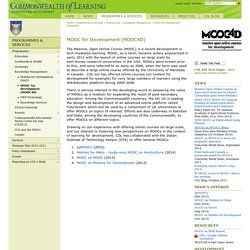
MOOC, as a term, became widely popularized in early 2012 with the launch of online courses on large scale by well-known research universities in the USA. MOOCs were known prior to this, and were referred to as early as 2008, when the term was used to describe a large online course offered by the University of Manitoba in Canada.. COL too has offered online courses (on content for development for example) for very large numbers of learners using the WikiEducator platform during 2006-2008. There is serious interest in the developing world in assessing the value of MOOCs as a medium for expanding the reach of post-secondary education.
Among the Commonwealth countries, the OU UK is leading the design and development of an advanced online platform called FutureLearn which will be used by a consortium of UK universities to offer MOOCs on topics of interest. Bonk, C. J., Lee. M. M., Reeves, T. C., & Reynolds, T. H. (2015). Preface: Actions leading to “MOOCs and Open Education Around the World.” In Bonk, Lee., Reeves, & Reynolds, T. H. (Eds.), MOOCs & Open Ed Around the World. Routledge (bit.ly/1IRCvQh). http: Open Education at the University of Cape Town , Laura Czerniewicz, Glenda Cox, Cheryl Hodgkinson-Williams, and Michelle Willmers, University of Cape Town, South Africa PART THREE.
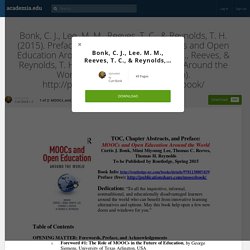
Researching and Evaluating Notions of MOOCs and Openness Strange Bedfellows?! : What can MOOCs learn from Distance Education? Infografik: Welche Creative-Commons-Lizenz passt zu mir? Steady Online Learning Growth in HigherEd, Faculty Clueless on OER. After years of support from Sloan, the annual survey of higher education was sponsored this year by Pearson and conducted by Babson Survey Research Group.
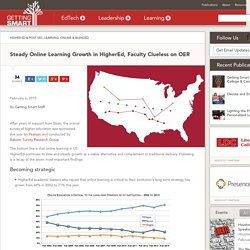
The bottom line is that online learning in US HigherEd continues its slow and steady growth as a viable alternative and complement to traditional delivery. Following is a recap of the seven most important findings. Becoming strategic HigherEd academic leaders who report that online learning is critical to their institution’s long term strategy has grown from 48% in 2002 to 71% this year. Efficacy? About three quarters of academic leaders rate the quality on online learning superior to those in face-to-face instruction.However, only 28% of academic leaders say that their faculty members accept the “value and legitimacy of online education,” unchanged from 2003. Growth Growth of online learning slowed to 4% but it’s still growing faster than face-to-face. Unbelievably unaware of OER Cost concerns registering Methodology. Mit der Lizenz zum Lernen - duz Magazin - duz - unabhängige deutsche Universitätszeitung - Magazin für Forscher und Wissenschaftsmanager.
Sie sind kostenlos und überall am PC verfügbar – frei zugängliche Lehr- und Lernmaterialien, sogenannte Open Educational Resources.
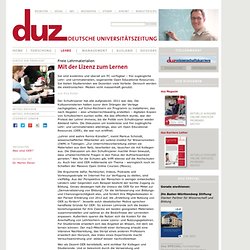
Sie bieten Studierenden wie Dozenten viele Vorteile. Dennoch werden die elektronischen Medien nicht massenhaft genutzt. von Eva Keller Der Schultrojaner hat alle aufgeweckt. 2011 war das. Die Kultusministerien hatten zuvor dem Drängen der Verlage nachgegeben, auf Schul-Rechnern ein Programm zu installieren, das nach illegalen – also urheberrechtswidrig erstellten – digitalen Kopien von Schulbüchern suchen sollte. „Lehrer sind wahre Remix-Künstler“, meint Markus Schmidt, wissenschaftlicher Mitarbeiter am Leibniz-Institut für Wissensmedien (IWM) in Tübingen: „Zur Unterrichtsvorbereitung ziehen sie Materialien aus dem Netz, bearbeiten sie, tauschen sie mit Kollegen aus.
Makerspaces und KAS Junior-Experts. Makerspaces sind öffentliche Räume, an denen Tools und Materialien zu finden sind, um kreativ und produktiv werden zu können.
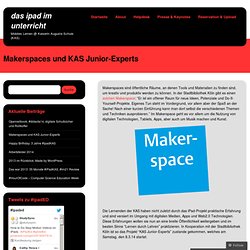
In der Stadtbibliothek Köln gibt es einen solchen Makerspace: “Er ist ein offener Raum für neue Ideen, Potenziale und Do-It-Yourself-Projekte. Eigenes Tun steht im Vordergrund, vor allem aber der Spaß an der Sache! Nach einer kurzen Einführung kann man dort selbst die verschiedenen Themen und Techniken ausprobieren.” Im Makerspace geht es vor allem um die Nutzung von digitalen Technologien, Tablets, Apps, aber auch um Musik machen und Kunst.
Die Lernenden der KAS haben nicht zuletzt durch das iPad-Projekt praktische Erfahrung und sind versiert im Umgang mit digitalen Medien, Apps und Web2.0 Technologien. Schülerinnen und Schüler der Stufe 10 bieten dabei im Makerspace der Stadtbibliothek Köln sogenannte Maker-Workshops zu einem Bereich der digitalen Medien und Apps in kleinen Teams an. 1. Sie möchten gerne am PC kreativ arbeiten, eine Zeichnung zu erstellen. Microsoft Word - MOOCs and Open Education.docx - MOOCs-and-Open-Education.pdf.